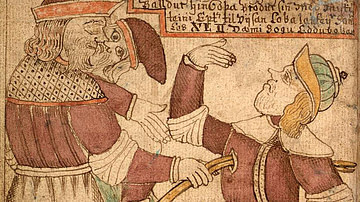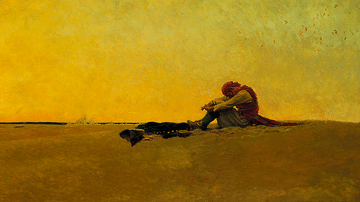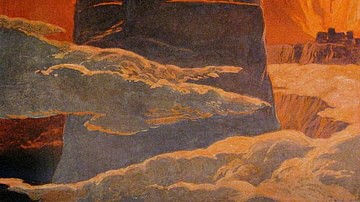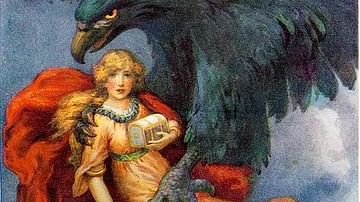Search Definitions
Browse Content (p. 81)

Definition
Enoch
In the book of Genesis in the pre-flood period, Enoch was the son of Jared and the father of Methuselah. There are few details about Enoch. We learn that he lived 365 years, and then Enoch "walked faithfully with God; then he was no more...

Definition
Baldr
Baldr is a god in Norse mythology associated with light, wisdom, and courage, although he is never specifically defined as the god of any of these. He is best known for his dramatic death, which heralds the coming of Ragnarök, the end of...

Definition
Henry Every
Henry Every (b. 1653), also known as Henry Avery, Benjamin Bridgeman, ‘Long Ben’ and (incorrectly) John Avery, was one of the most savage and successful pirates in the Golden Age of Piracy. Capturing a treasure ship of the Mughal emperor...

Definition
Simon Forman
Simon Forman (1552-1611) was an Elizabethan physician, astrologer, magician, and alchemist who lived and worked in both London and Wiltshire, England. He was unusual in that despite receiving no formal training in medicine or astrology, and...

Definition
Alexander Selkirk - The Inspiration For Robinson Crusoe
Alexander Selkirk (or Selcraig, 1676-1721) was a Scotsman famously marooned for four years and four months on a desert island in the Pacific Ocean until his rescue by a passing British ship in February 1709. His story inspired the title character...

Definition
Ragnarök
Ragnarök is the cataclysmic battle between the forces of chaos and those of order in Norse mythology, ending the world and killing most of the gods and their adversaries, leading to the birth of a new world. It has been claimed, however...

Definition
Woodes Rogers
Woodes Rogers (1679-1732) was a privateer turned administrator who was instrumental in the fight against piracy in the Caribbean when he served as Governor of the Bahamas (appointed 1717 and again in 1728). Rogers is also known for his three-year...

Definition
Idunn
Idunn (pronounced Ih-dune) is a fertility goddess in Norse mythology who holds the apples of eternal youth the gods rely on to remain young and healthy. The Norse gods were not immortal – they just lived very long lives – and the apples of...

Definition
Benjamin Hornigold
Captain Benjamin Hornigold was a British pirate active in the Caribbean and North Atlantic from 1716 to 1717. Hornigold’s greatest claim to fame (or infamy) is that he taught the pirating ropes to Edward Teach, aka Blackbeard (d. 1718). Giving...

Definition
Valkyrie
A Valkyrie is a figure in Norse mythology depicted as a warrior woman on horseback, a wolf or boar, and armed with a spear, who decides the fate of warriors in battle and carries the dead to Odin’s Valhalla. Valkyrie means "chooser of the...